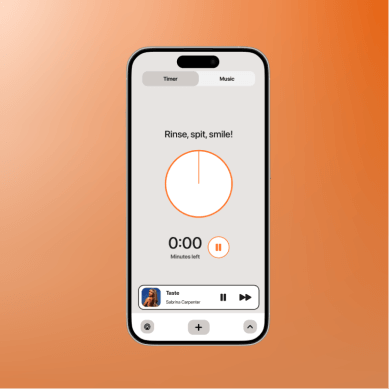BrushBuddy: A Fun and Educational Toothbrushing Experience
Transforming toothbrushing into a playful and engaging activity for children

Features
Transforming toothbrushing into a playful and engaging activity for children
Educational Content Development
Creating engaging and educational content that is both entertaining and informative for children.
Interactive Game Design
Developing a user-friendly interface that allows children to easily navigate and interact with the app.
Cross-Platform Compatibility
Ensuring the app works seamlessly across different mobile devices and operating systems.
Stats
Process
Research
Studied existing toothbrushing apps and children's app design trends to understand user expectations and preferences.
Ideation
Created mood boards and sketches to define the app's visual style and user flow. Focused on a cartoonish, playful design.
Prototyping
Developed low-fidelity wireframes and mid-fidelity prototypes using Adobe XD to refine the user flow and visual design.
Testing
Gathered feedback from children and parents to iterate on the design and content based on user feedback.
Research
Studied existing toothbrushing apps and children's app design trends to understand user expectations and preferences.
Ideation
Created mood boards and sketches to define the app's visual style and user flow. Focused on a cartoonish, playful design.
Prototyping
Developed low-fidelity wireframes and mid-fidelity prototypes using Adobe XD to refine the user flow and visual design.
Testing
Gathered feedback from children and parents to iterate on the design and content based on user feedback.
Design Elements
Cartoonish Design
Utilized a cartoonish and playful design language to appeal to children's visual preferences.
Colorful Animations
Added engaging animations and transitions to make the app more interactive and entertaining.
Easy-to-Use Navigation
Designed a simple and intuitive navigation structure that children can easily grasp.
Safe and Secure Environment
Implemented robust security measures and parental controls to ensure a safe and secure experience for children.
Outcomes
Insights
Insights and Lessons Learned
Key takeaways from the BrushBuddy development project:
User-Centered Design
Designing for children requires a playful, intuitive, and safe approach.
Iterative Testing
Frequent feedback from real users (children and parents) is crucial.
FAQs
What was the main goal of the BrushBuddy app?
To make toothbrushing fun and educational for children, encouraging healthy habits through gamification.
How was safety addressed?
The app includes parental controls and robust privacy measures to ensure a safe environment for kids.